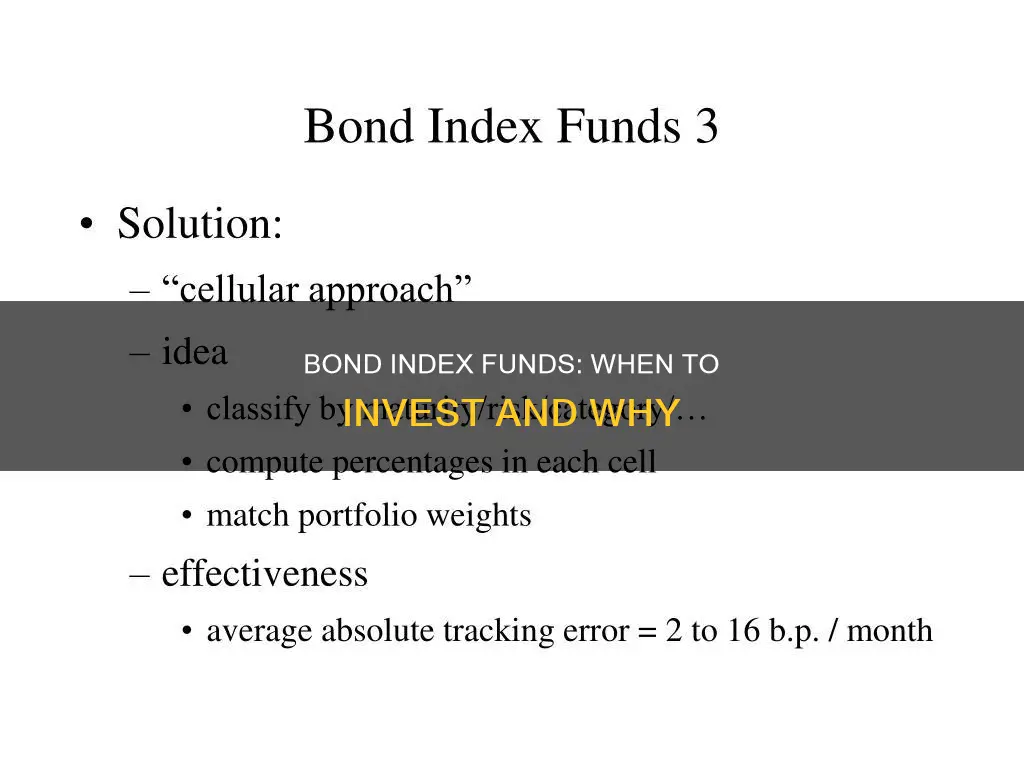
Bonds are a way for governments or companies to borrow money from investors, who receive regular income in the form of coupon payments. Bond index funds are a type of investment fund that holds a selection of bonds intended to reflect the performance of a particular index. They are a form of passive investing, aiming to mimic the performance of the bond market rather than seeking to outperform it. This means they involve a smaller degree of management and lower fees. However, they are highly sensitive to fluctuations in the interest rate environment, which can lead to volatility. When deciding whether to invest in bond index funds, it is important to consider the benefits of bond index funds versus individual bonds, as well as your personal investment goals, risk tolerance, and time horizon.
| Characteristics | Values |
|---|---|
| Pros | Diversified, low-fee investing |
| Passive investing | |
| Lower fees | |
| Easier to invest | |
| Greater diversification per dollar invested | |
| Access to institutional pricing | |
| Professional management | |
| Cons | Volatility related to rate changes |
| Lower performance than other fund-based investments | |
| Long-term volatility | |
| Higher management fees | |
| Net asset value (NAV) will fluctuate with the market | |
| Different cost basis and tax consequences |
What You'll Learn

Pros and cons of bond index funds
Pros of Bond Index Funds:
- Diversification: Bond index funds are highly diversified, providing exposure to a wide range of bonds within a single fund. This makes it easier to achieve a diversified portfolio with a smaller investment.
- Low fees: Bond index funds are passively managed, aiming to mimic the performance of a specific bond index. This passive approach results in lower management fees compared to actively managed funds. The savings from lower operating costs are passed on to investors in the form of reduced fees.
- Consistent performance: Index funds perform more consistently than actively managed funds. Since they track a specific index, their performance is predictable and closely matches the broader market.
- Simplicity and accessibility: Bond index funds are easy to invest in through investment firms or by purchasing shares of a bond ETF through an online brokerage. They are also straightforward to understand for most people.
- Monthly payments: Most bond funds pay interest on a monthly basis, whereas individual bonds typically make semi-annual payments.
Cons of Bond Index Funds:
- Long-term volatility: Bond index funds, especially those investing in government securities, are highly sensitive to interest rate fluctuations, leading to potential volatility over the long term.
- Lower performance: Bond index funds may underperform compared to other fund-based investments, particularly those that are actively managed and aim to beat the market.
- Lack of control: In a bond index fund, investors cannot control the buying and selling of individual bonds, which can lead to unexpected capital gains distributions at the end of the year.
- Tax implications: The pooled nature of bond funds results in a different cost basis and tax consequences compared to individual bonds. The frequent buying and selling of bonds within the fund can lead to less tax efficiency.
- Management fee: While lower than actively managed funds, bond index funds may still have a management fee, which can impact overall returns.
Vanguard Funds: Best Investment Options for Now
You may want to see also

Bond index funds vs. individual bonds
Overview
Bond index funds and individual bonds are fundamentally different instruments. While bond funds are managed by professionals and offer diversification, individual bonds give you more control over your portfolio and a predictable value at maturity.
Bond Index Funds
Bond index funds are a type of investment fund that holds a selection of bonds intended to reflect the performance of a particular bond index, like the Barclays Aggregate U.S. Bond Index. They are a form of passive investing, aiming to mimic the performance of the bond market rather than seeking to outperform it. This means they have lower fees than actively managed funds.
Bond index funds are highly sensitive to fluctuations in the interest rate environment and can be volatile. They are composed of various bonds, each with a different maturity date, and fund managers can buy and sell these at will. While they typically make monthly payments, you won't know when or if you're getting your principal back.
Individual Bonds
Individual bonds give you greater control over what's in your portfolio. You choose what you buy and whether to hold those bonds until maturity or sell them early. This means you can better plan and control your income stream, as you know the maturity dates and coupon payment dates.
Individual bonds typically require a higher initial investment amount compared to bond funds, as they usually trade with a minimum order quantity. They also require significant research and ongoing monitoring to assemble and manage a diversified portfolio.
One of the key benefits of individual bonds is that you will receive a reliable income stream, which is great for planning. Assuming the bond is not "callable", you will receive the par value of the bond at maturity, barring default.
The right choice for you depends on your financial goals, time horizon, and risk tolerance. If you're looking for predictable value and certainty, individual bonds may be a better fit. If you want professional management and greater diversification, then bond index funds are likely a better option.
The Right Time to Invest in Index Funds
You may want to see also

Bond mutual funds vs. bond ETFs
Bond mutual funds and bond exchange-traded funds (ETFs) are two investment options that pool funds into a diversified, fixed-income portfolio. However, there are some key differences between the two.
Bond Mutual Funds
Bond mutual funds are actively managed, meaning a fund manager allocates the pooled capital from investors to various fixed-income securities. They are bought and sold only at the end of the trading day at the net asset value (NAV). They often have a minimum investment requirement and are suitable for investors seeking professional management and specific investment strategies. Mutual funds have been investing in bonds for many years, and there are a large number of funds available, offering a significant variety of investment options.
Bond ETFs
Bond ETFs, on the other hand, track an index of bonds with the goal of matching the returns from the underlying index. They are typically passively managed and traded throughout the day on stock exchanges at market prices, which can fluctuate. Bond ETFs can be bought with a single share, making them accessible with less capital. They are generally more tax-efficient and have lower expense ratios, making them attractive to investors looking for cost efficiency and ease of trading. Bond ETFs are a newer entrant to the market compared to mutual funds, with the first bond ETF launched in 2002.
The decision to invest in bond mutual funds or bond ETFs depends on the investor's objectives. If you want active management and more investment choices, bond mutual funds are preferable. Bond ETFs are a good choice if you plan to buy and sell frequently. For long-term, buy-and-hold investors, both options can meet your needs, but it is important to research the holdings in each fund.
Business Fund Investments: Expansion Strategies and Opportunities
You may want to see also

When are bond index funds right for you?
Bond index funds are a good investment option for those seeking a diversified, low-fee investment portfolio. They are also suitable for investors who want exposure to safer, low-fee securities. However, it is important to understand the difference between the benefits of bond index funds and individual bonds before investing.
Benefits of bond index funds
Bond index funds are a diversified portfolio of bonds chosen to align with the performance of a specific bond index. They are a form of passive investing, aiming to mimic the performance of the bond market rather than seeking to outperform it. This results in lower management and operating costs, which are passed on to investors in the form of lower fees.
Most bond funds pay interest monthly, and they may climb with interest rates. Additionally, fund managers can try to increase income payments by buying newer bonds with higher coupon rates when interest rates rise.
Benefits of individual bonds
Individual bonds offer a reliable income stream, making them great for planning. They also provide a predictable value at maturity and allow you to have your own cost basis for tax-planning purposes.
Downsides of bond index funds
The main downside of bond index funds is their long-term volatility. As most broad-based bond index funds invest in government securities, they are highly sensitive to fluctuations in the interest rate environment. This means that, unlike individual bonds, the risk of holding a bond fund does not necessarily decrease over time or as the maturity date approaches.
Additionally, with bond funds, there is no guarantee that you will recover your principal at a specific time, especially in a rising-rate environment.
Downsides of individual bonds
Individual bonds require a significant amount of bonds to achieve diversification, which can be cost-prohibitive for some investors. Pricing for individual investors is also generally less attractive than the pricing institutional investors receive.
Individual bonds also take a significant amount of time to research and manage, as there are thousands of individual bonds and issuers available, each with its own characteristics.
Other considerations
When deciding whether to invest in bond index funds or individual bonds, it is important to consider your personal investment goals, risk tolerance, and financial strategy.
If you are looking for predictable value and certainty, individual bonds may be a better option. On the other hand, if you prefer professional management and greater diversification, bond index funds may be more suitable.
It is also important to consider your behavioural preferences. If seeing the net asset value of your fund fluctuate makes you uncomfortable, or if you prefer to have control over certain tax consequences, individual bonds may be a better fit.
Bond index funds are right for you if you are seeking a diversified, low-fee investment portfolio and are comfortable with the associated risks and downsides. They are also a good option if you want exposure to safer, low-fee securities and are willing to accept the potential volatility and lack of control over principal recovery.
It is always recommended to consult with a financial advisor to guide you in selecting the bond index funds that are right for your unique circumstances.
What's the Return on Investment for Founders?
You may want to see also

How to choose between bond funds and bond ETFs
When deciding between bond funds and bond ETFs, it is important to consider your investment goals, risk tolerance, and financial strategy. Here are some key factors to help you choose between the two:
Bond Funds:
- Professional Management: Bond funds are actively managed by fund managers who allocate capital to various fixed-income securities. This can be advantageous for investors who prefer to delegate investment decisions.
- Diversification: Bond funds hold a large number of bonds with different maturities, coupon rates, and credit ratings, providing diversification across various types of bonds (government, municipal, corporate, etc.).
- Predictable Income: Bond funds typically pay interest monthly, and the income is relatively predictable compared to bond ETFs, which can vary depending on the bonds in the portfolio.
- Higher Expenses: Bond funds often have higher expense ratios due to active management and other fees. These higher expenses can eat into the returns generated by the fund.
- Tax Inefficiency: Bond funds are less tax-efficient due to frequent buying and selling by the manager, potentially leading to unexpected capital gains distributions.
- Minimum Investment: Bond funds often have minimum investment requirements, which can vary from a few thousand dollars.
Bond ETFs (Exchange-Traded Funds):
- Lower Fees: Bond ETFs are typically passively managed, tracking a bond index, and have lower expense ratios compared to bond funds. This makes them more cost-efficient.
- Flexibility: Bond ETFs are traded on stock exchanges throughout the trading day, offering real-time pricing and flexibility to buy and sell.
- Transparency: Bond ETFs disclose their holdings daily, providing complete transparency into the bonds held within the fund.
- Accessibility: Bond ETFs usually have no minimum investment requirement, and you can buy a single share, making them accessible to investors with less capital.
- Tax Efficiency: Bond ETFs are more tax-efficient, especially if they track an index, due to lower portfolio turnover.
- Volatility: Bond ETFs can be highly volatile, especially those that invest heavily in government-backed securities, as they are sensitive to changes in interest rates.
- Principal Risk: There is no guarantee of getting your principal back with bond ETFs, as they do not have a specific maturity date.
In summary, if you seek professional management, diversified exposure across bond types, and predictable income, bond funds may be more suitable. On the other hand, if you prioritize cost efficiency, flexibility, transparency, and accessibility, bond ETFs could be the better choice. Remember to consider your financial goals, risk tolerance, and investment horizon when making your decision.
Bond Funds: Best Time to Invest and Why
You may want to see also
Frequently asked questions
Bond index funds are a diversified portfolio of bonds chosen to align with the performance of a particular index. They are a passive investment strategy that aims to mirror the performance of the bond market, rather than seeking to outperform it.
Bond index funds offer investors a window to diversified, low-fee investing. They are less management-intensive than other funds, and these savings can be passed on to investors in the form of lower fees. Most bond funds also pay interest on a monthly basis, as opposed to individual bonds, which tend to do this semi-annually.
Bond index funds are highly sensitive to fluctuations in the interest rate environment, which can lead to long-term volatility. They may also underperform when compared to other fund-based investments.







